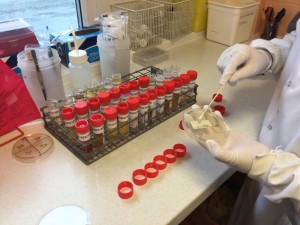 I have just completed my on-call week. As many will know our working pattern means one consultant is first on service for a seven day period. This ensures a degree of continuity when we receive calls and are dealing with the acute services. In this role, we are the first point of contact for enquiries and I thought therefore I would reflect on a couple of the highlights.
I have just completed my on-call week. As many will know our working pattern means one consultant is first on service for a seven day period. This ensures a degree of continuity when we receive calls and are dealing with the acute services. In this role, we are the first point of contact for enquiries and I thought therefore I would reflect on a couple of the highlights.
Little Thing #1:
One of my local GP’s rang to ask for a urine sensitivity result. I am always at pains to be as helpful as I possibly can when I get these calls, which are as a result of antibiotic suppression rules we have instigated. I talked a little about this in my last article. I appreciate that GP’s are as busy as everyone else these days but as a result of others failing to provide adequate details of request forms, they find themselves having to sort out what is going on with a patient. As seems to be my experience with most of these calls however, they do seem to see that we are all working on this together and as that previous article illustrates, we appear to be making a difference.
What was refreshing and uplifting for me about this call was that she went on to say that following a previous conversation with our services, in combination with the patient in question, they agreed that he should stop his long term prophylactic antibiotics for recurrent UTI and in stead, hold a treatment course of antibiotics at home, together with a sample pot for urine and a request form pre-filled, to which he would just add the date if he developed acute symptoms of UTI. This is what had happened but he had been symptom free (and antibiotic free) for six-months. The GP had prescribed trimethoprim and wanted to check if was effective, which it was. What is more, there was no evidence of multi-drug resistance – the isolate was only resistant to amoxicillin, which is the case with around 50% of our isolates.
Stories like this emphasise for me that while there is a lot of worry about antimicrobial resistance, if we use what we have wisely, avoiding use when we can, then the predominant bacteria we meet will remain sensitive strains.
Little Thing #2:
As a result of our Clinical Pathology Accreditation visit to the lab in Withybush Hospital, we were asked to develop a route to ensuring we were meeting the needs of our clinical users. While we have a lot of regular conversations with the clinicians who use our services, indeed every conversation like the one described above may lead to insights of development needs, they wanted to see a more formal approach. As a result, on our reports, we have been including a link to our professional feedback page, which is discussed on our Consultant Services page.
Yesterday evening, we had our fist response from one of our service users, which really is a tiny-weeney little thing but made my week complete to know that someone had taken the time to respond to us and provide feedback. I look forward to more responses in the future.
Great article as always Mike!
Many thanks, Claire. Interestingly, you are one of the first to ever comment here and the aim was to allow clinicians or the public/patients to also ask questions, with the proviso of course that we would not want to debate personal health related issues on an open forum. For that reason, all comments are held for moderation prior to publication.